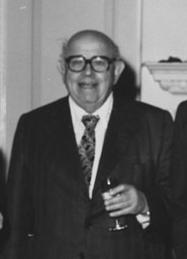Vous pouvez contribuer simplement à Wikibéral. Pour cela, demandez un compte à adminwiki@liberaux.org. N'hésitez pas !
Nicholas Kaldor
| Nicholas Kaldor | |||||
| Économiste | |||||
|---|---|---|---|---|---|
| Dates | 1908 - 1986 | ||||

| |||||
| Tendance | Post-keynésien | ||||
| Nationalité | |||||
| Articles internes | Autres articles sur Nicholas Kaldor | ||||
| Citation | |||||
| Interwikis sur Nicholas Kaldor | |||||
Nicholas Kaldor, né le 12 mai 1908 à Budapest et décédé le 30 septembre 1986 à Papworth Everard (Royaume-Uni), est un économiste britannique post-keynésien.
Biographie et travaux
Il fut étudiant à la London School of Economics, de 1927 à 1930, où il reçu les cours d’Allyn Young et de Lionel Robbins, puis y enseigna jusqu’en 1947 avant de rejoindre la King’s College à Cambridge.
Dans un article publié en 1939 dans la Review of economic studies, intitulé "Spéculation et stabilité économique", il examine les effets de la spéculation sur la stabilité économique, où il critique la notion traditionnelle de la spéculation comme étant l'achat ou la vente de marchandises à une date ultérieure, là où le mobile d'une telle action est l'anticipation des changements des prix en vigueur, et non un avantage résultant de leur emploi, ou une transformation ou un transfert d'un marché à un autre. Pour Kaldor, le motif de la spéculation dans l'anticipation d'un changement imminent du prix implique que le spéculateur posséde une faculté de prévoyance supérieure à la moyenne, il doute fortement de la même capacité de prévision de la part de tous les spéculateurs, il doute aussi, par conséquent, du rôle et l'influence stabilisatrice des spéculateurs sur les prix, soutenant qu'il s'agit que d'une petite fraction des transactions totales.
Partisan de l'intervention de l'Etat, il devient conseiller spécial du Chancelier de l’Échiquier (ministre de l’Économie et des Finances) de plusieurs gouvernements travaillistes, de 1964 à 1968 puis de 1974 à 1976. Après avoir pris sa retraite en 1975, il polémique avec les monétaristes qui inspirent le gouvernement de Margaret Thatcher.
Ouvrages traduits en français
- Economie et instabilité, Economica, 1988
Littérature
- 1932, "The economic situation of Austria", Harvard Business Review, 11(10), pp23–34
- 1934, "The equilibrium of the firm", Economic Journal, Vol 44, pp60–76
- 1937, "Annual Survey of Economic Theory : The Recent Controversy on the Theory of Capital", Econometrica, 3(5), pp201-248
- 1939,
- a. Welfare propositions of economics and interpersonnal comparisons of utility, The Economic Journal, Volume 49, Issue 195
- b. commentaire du livre d'Arthur Marget, "The Theory of Prices: An Examination of the Central Problems of Monetary Theory", Economic Journal, September, pp495-498.
- 1942,
- a. "Professor Hayek and the concertina effect", Economica, Vol 9, n°36, Nov., pp359-382
- Repris en 1960, In: Nicholas Kaldor, dir., "Essays on Economic Stability and Growth", Londres, Duckworth
- b. "The Income Burden of Capital Taxes", Review of Economic Studies, Summer
- Repris en 1959, In: "American Economic Association’s Readings in the Economics of Taxation", Richard D. Irwin, Inc., Homewood, Illinois
- a. "Professor Hayek and the concertina effect", Economica, Vol 9, n°36, Nov., pp359-382
- 1948, avec Rodney Silverman, "A Statistical Analysis of Advertising Expenditure and of the Revenue of the Press", Cambridge Univ. Press
- 1950, "The Economic Aspects of Advertising", Review of Economic Studies, Vol 18, pp1-27
- 1955, "Alternative Theories of Distribution", Review of economic studies, Vol XXIII, n°2
- Repris en 1960, "The place of Marshall’s Principles in the Development of Economic Theory", In: Joseph Spengler, W. R. Allen, dir. "Essays in Economic Thought: Aristotle to Marshall", Chicago: Rand McNally, pp741-752
- 1962, Capital accumulation and economic growth, Seminar on the programming of economic development
- 1964, "‘Prospects for a wages policy for Australia’", Economic Record, 40(90), June, pp145-155
- 1970, "‘The new monetarism’", Lloyds Bank Review, 97, pp1-18
- 1972, "The irrelevance of equilibrium economics", Economic Journal, Vol 82, pp1237–1255
- 1982, "The Scourge of Monetarism", Oxford, Oxford University Press
- Traduit en français en 1985, Le fléau du monétarisme, Economica
Littérature secondaire
- 1971, W. W. Chang, D. J. Smyth, "The Existence and Persistence of Cycles in a Non-linear Model: Kaldor's 1940 Model Re-Examined", Review of Economic Studies, Vol 38, pp40-44
- 1979, Luigi L. Passinetti, "Kaldor, Nicholas", In: David L. Sills, dir., "International Encyclopedia of the Social Sciences: Bilgraphical Supplement", Vol 18, New York: Free Press, pp366-369 (en)
- 1987, A. P. Thirlwall, "Nicholas Kaldor", Brighton, U.K.: Wheatsheaf Books
- 1991, John Kenneth Galbraith, "Nicholas Kaldor remembered", In: E. J. Nell, W. Semmler, dir., "Nicholas Kaldor and mainstream economics: Confrontation or convergence?", New York: Palgrave Macmillan, pp48–49
- 1997, A. P. Thirlwall, "Kaldor, Nicholas (1908-1986)", In: David Glasner, Thomas F. Cooley, dir., "Business Cycles and Depressions: An Encyclopedia", New York: Garland Publishing, Inc., pp349-351
- 2006, Yuichi Kimura, "Kaldor on Hayek's Theory of Capital: 1936-1942", The History of Economic Thought, Vol 48, n°1, June
- 2011,
- Hansjörg Klausinger, "Hayek and Kaldor: close encounter at LSE", History of Economic Ideas, vol XIX, n°3, pp135-166
- Michael Munger, “Kaldor-Hicks Coercion, Coasian Bargaining, and the State”, In: Jorge Martinez et Stanley Winer, dir., "Coercion and Social Welfare in Contemporary Public Policy"
Lien externe
- (en)
 [pdf]The Kaldor/Knight controversy: Is capital a distinct and quantifiable factor of production ?, Avi J. Cohen
[pdf]The Kaldor/Knight controversy: Is capital a distinct and quantifiable factor of production ?, Avi J. Cohen
Voir aussi
| Accédez d'un seul coup d’œil au portail économie. |